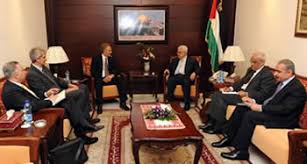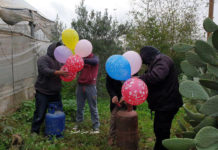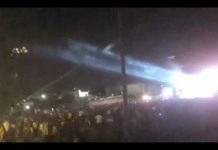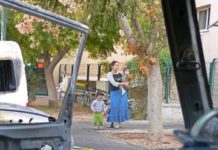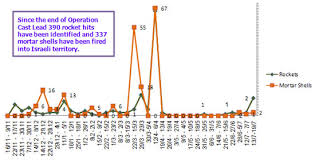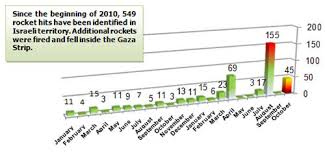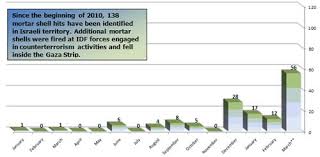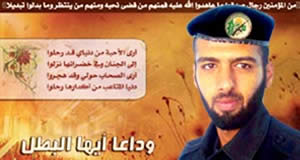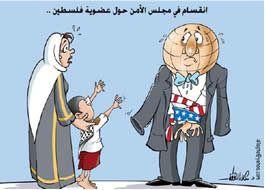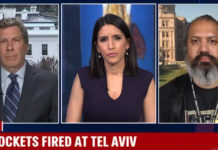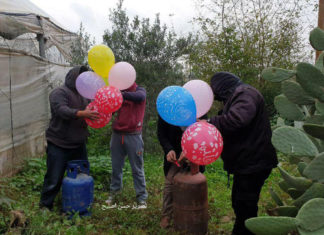|
News of Terrorism and the Israeli-Palestinian Conflict
(November 9-15, 2011 ) |
||||||||||||
Rocket fire into Israel This past week one rocket hit was identified in Israel territory (on November 13). The rocket fell in an open area. There were no casualties and no damage was done. Rockets and Mortar Shells Fired into Israeli Territory 1 Rocket Fire — Monthly Distribution
Mortar Shell Fire — Monthly Distribution
Israeli Air Force Activity In response to the continuing rocket fire, Israeli aircraft attacked two terrorist targets in the Gaza Strip:
Judea and Samaria The Situation on the Ground This past week the IDF carried out routine counterterrorist activities in Judea and Samaria, detaining Palestinians suspected of terrorist activities and confiscating weapons. There were also a number of incidents of stones and Molotov cocktails thrown at Israeli vehicles. Israeli Vehicle Mistakenly Attacked by IDF Force In the early morning hours of November 11 an IDF force south of Hebron identified a suspicious vehicle. It was speeding and the driver did not heed the calls of the soldiers, who took positions at the crossroads to stop it. One of the soldiers, who felt his life was in danger, opened fire at the vehicle, which swerved off the road and stopped. The driver of the car was killed and two of the passengers were wounded, one seriously and the other with minor injuries. An examination revealed that the vehicle belonged to Israeli settlers and was driven by Rabbi David Mertzbach, 55, from the village of Otniel. The IDF is investigating the circumstances of his death (IDF Spokesman, November 11, 2011).
The Israeli Air Force Strikes a Coast Guard Post in the Northern Gaza Strip The Palestinian media reported that the target of the IAF strike on November 14 was a coast guard post in northern Gaza City. The strike resulted in the death of coast guardsman Muhammad Zaher al-Kilani and the wounding of four other Palestinians (Wafa News Agency, November 14, 2011). The Izz al-Din al-Qassam Brigades, Hamas’ military-terrorist wing, said in an official statement that one of its operatives had been killed in the strike (Izz al-Din al-Qassam Brigades website, November 14, 2011).
Hamas’ coast guard was established after Hamas’ violent takeover of the Gaza Strip in June 2007. Many of its operatives also belong to the Izz al-Din al-Qassam Brigades and also have military-terrorist duties which have no relation to the coast guard. In addition, the coast guard has been involved in operational activities against Israel which have no relation to its stated functions. Many policeman and members of Hamas’ other security forces also belong to the Izz al-Din al-Qassam Brigades, indicating the extensive operational cooperation between the security forces and Hamas’s military-terrorist wing.2 Ismail Haniya, head of the de-facto Hamas administration in the Gaza Strip, who attended al-Kilani’s funeral, accused Israel of violating the lull and said that there was no official lull agreement with Israel, only the Palestinian commitment to the Egyptians (BBC, November 14, 2011).
Statements from High-Ranking Hamas Figures Interviewed by the Russian newspaper Izvestia, Ismail Haniya, head of the de-facto Hamas administration, spoke about various current issues (Izvestia, November 7, 2011):
Interviewed by the media, Mahmoud al-Zahar, a member of Hamas’ political bureau, said that Hamas did to negotiate with Israel, directly or indirectly, only on “purely humanitarian” issues, such as the exchange of prisoners for Gilad Shalit (Al-Hayat, November 12, 2011). The Fatah-Hamas Dialogue As part of the attempts to promote the Fatah-Hamas reconciliation, preparations continue for Mahmoud Abbas, chairman of the Palestinian Authority, to meet with Khaled Mashaal, head of Hamas’ political bureau. Palestinian sources report November 24 or 25 as the date for the meeting in Cairo. According to highly-placed Palestinian sources, preliminary contacts are being made between Azzam al-Ahmed, a member of Fatah’s Central Committee, and Musa Abu Marzouk, deputy head of Hamas’ political bureau, to ensure the meeting’s success (AKI News Agency and Al-Quds, November 12, 2011). Egypt demanded that Mahmoud Abbas complete the preliminary contacts so that the meeting between him and Khaled Mashaal would complete the process. The objective of the meeting is to decide the name of the future Palestinian prime minister and to finalize the security issues between the two sides (Egyptian daily Ruz al-Yusuf, November 13, 2011). Sources in Hamas commented on the possibility of reaching a reconciliation agreement and meeting between Fatah and Hamas:
Mahmoud Abbas Meets the Quartet On November 14 the International Quartet held another meeting with Mahmoud Abbas. On the eve of the meeting Nabil Abu Rudeina, the Palestinian Authority presidential spokesman, said that the Palestinians were prepared to negotiate with Israel on the basis of the Quartet declaration which included a cessation of construction in the settlements and recognition of the 1967 borders, but that Israel had not yet made its position clear. He also said that the Quartet should force Israel to make its intentions clear, or itself take a clear stand regarding Israeli stubbornness (Radio Sawa, November 9, 2011). On November 14, after the meeting, Saeb Erekat, head of the Palestinian negotiating team, said that during the meeting the top members of the Palestinian Authority had voiced their positions on the final status agreement. He said that the PA would be willing to negotiate directly with Israel if Israel fulfilled its commitments to the Road Map, that is, a cessation of construction in the settlements and recognition of the 1967 borders as the basis for negotiations (Wafa News Agency, November 14, 2011). The Palestinian Authority Bid for Membership in the United Nations The report of the UN Security Council admissions committee which deliberated the Palestinian Authority’s request for “Palestine” to be admitted to the United Nations stated that the committee had not been able to recommend its admission because a minimum majority of nine member states could not be found to support the Palestinians’ request (Reuters, November 8, 2011). That means that at this stage the Security Council will not hold a vote on the admission of Palestine into the UN. Palestinian Authority spokesmen voiced disappointment, saying that they would now consider alternative plans. One of the suggestions, which had previously been made by the Arab bloc in the UN, was to raise the status of the Palestinian Authority in the UN from observer to non-member country, similar to the status of the Vatican and Switzerland. There were various Palestinian responses to the Security Council decision:
The Palestinian Campaign to Boycott Israeli Merchandise Mustafa Barghouti, independent member of the Palestinian Legislative Council and secretary general of the National Palestinian Initiative Committee, claimed that its campaign to boycott Israeli merchandise had had “unprecedented success.” He said that the objective of the campaign, which was part of the so-called “popular resistance,” had caused damage and losses to Israel’s economy and created jobs for Palestinians. He added that in light of the success, another such operation would be announced in the near future (Watan, November 13, 2011). The campaign is part of the larger BDS (boycott, divestment, sanctions) campaign being waged against Israel by various Palestinian activists and NGOs from the territories in collaboration with international networks operating to promote the delegitimization campaign against Israel.
Delegation of High-Ranking Parliamentarians to the Gaza Strip The European Campaign to End the Siege on Gaza (ECESG) announced that a delegation of about 200 high-ranking parliamentarians and international politicians was expected to arrive in the Gaza Strip on November 21. According to Ramy Abdu, the campaign coordinator, the delegation’s objective is to stress the international objection to the so-called Israeli “siege” of the Gaza Strip. He added that the delegation would represent countries all over the world, including high-ranking figures from Tunisia, Libya, Egypt, Africa, Asia and Europe. The members of the delegation would set out on November 18 and gather in Egypt. Their visit to the Gaza Strip would last three days (Al-Quds Al-Arabi, November 10, 2011). The Miles of Smiles 8 Convoy Isam Yousef, coordinator of the Miles of Smiles convoys, said that the eighth convoy would set out for the Gaza Strip at the beginning of January 2012 (Alresalah.net website, November 9, 2011). The seventh convoy entered the Gaza Strip through the Rafah crossing on November 4. Yousef added that another LifeLine convoy was expected to arrive in the Gaza Strip soon, headed by anti-Israeli pro-Palestinian former British MP George Galloway (Alresalah.net website, November 9, 2011). Organizing Propaganda Events to Protest the “Judaization” Salah Sultan, chairman of the Jerusalem Committee of the World Federation of Muslim Scholars, said that they were currently examining the possibility of organizing a mass demonstration (dubbed the “million man demonstration”) in Cairo on November 21 to protest the “Judaization” of Jerusalem. He said contacts were being made with important Muslim figures, such as Ahmed al-Tayyib, Sheikh al-Azhar and Sheikh Yussuf al-Qardawi3 to ask them to participate in organizing the event. In addition, an Islamic event is supposed to be held near the Israeli-Jordanian border on November 25 to underline the Islamic identity of Jerusalem. 1 The statistics do not include rockets and mortar shells fired which fell inside the Gaza Strip. As of date November 15, 2011. 2 For further information see the March 2010 bulletin “Hamas and the Terrorist Threat from the Gaza Strip: The Main Findings of the Goldstone ReportVersus the Factual Findings,” Section III at http://www.terrorism-info.org.il/malam_multimedia/English/eng_n/pdf/g_report_e1.pdf. 3 Al-Qardawi, who resides in Qatar, is considered the Muslim Brotherhood movement and Hamas’ highest religious and ideological authority, although he has no formal standing in either movement. |
||||||||||||
News of the Palestinian-Israeli Conflict (November 9-15, 2011)
